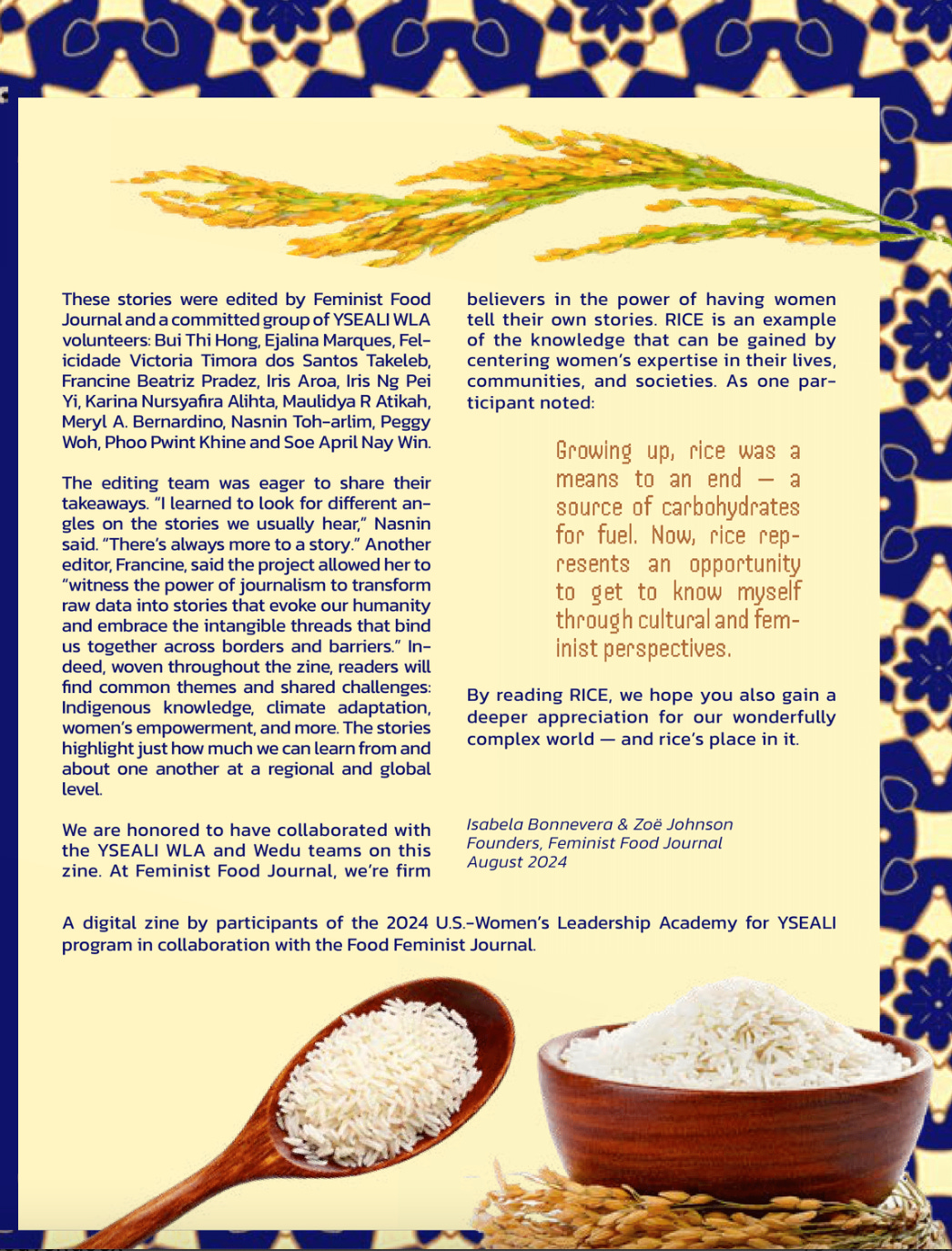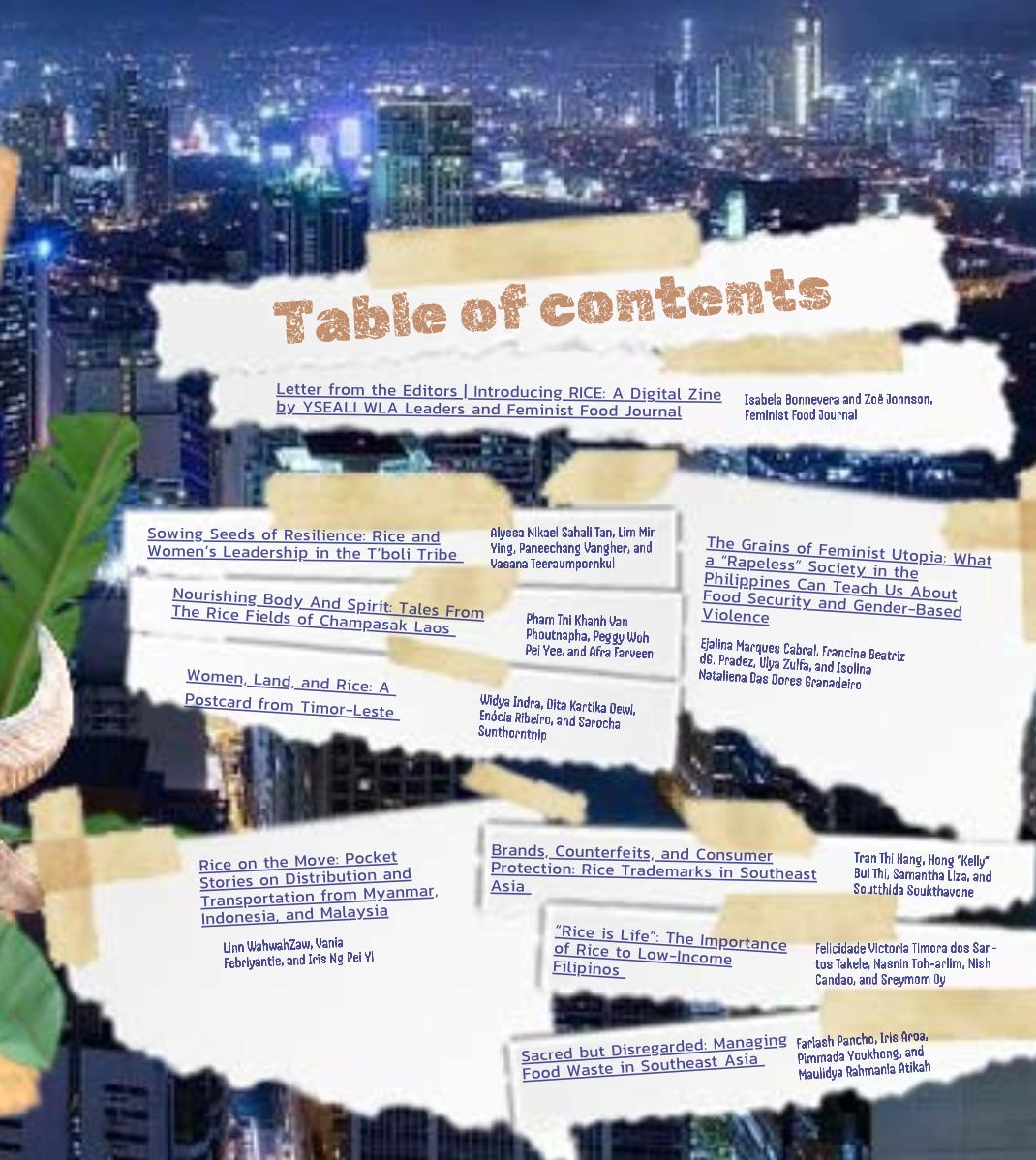Introducing RICE
A new zine produced by FFJ and food security leaders in Southeast Asia
We’re thrilled to kick off 2025 by announcing the publication of RICE, a new zine produced by Feminist Food Journal, partner Wedu, and 60 young women food security leaders from across Southeast Asia. (The zine was designed externally by the Wedu team and Anna Denardin.)
In Wedu’s words:
“We proudly present RICE, a zine born from the 2024 U.S.-ASEAN Women’s Leadership Academy for YSEALI. This zine explores the deep connections between rice, food security, climate resilience, and gender equity in the ASEAN union.
From stories on trademarks protecting cultural heritage, to communities where rice grains lay the fundament for a feminist utopia — the ten short stories in this zine reflect the diverse knowledge of 60 women leaders in food security, from 11 ASEAN countries.
Edited and facilitated by the award-winning Feminist Food Journal, we invite you to flip through these stories and reflect on how rice brings us together and nourishes people, cultures, and landscapes.”
What is RICE?
In 2024, we were contracted by Wedu, an organization focused on empowering women leaders, to teach storytelling skills and help produce a zine for the 2024 U.S.-ASEAN Women’s Leadership Academy for YSEALI.
The YSEALI academy has a different theme each year, and the 2024 edition was focused on food security. Around 60 women food security leaders from across the region1 participated. These women hailed from a variety of professional backgrounds, ranging from plant scientists and marketing analysts to food business owners and farmers. Most participants had no prior journalism experience.
The zine was one of the academy’s key outputs, and Wedu had the great idea for it to focus on rice — a staple food in the region whose production, distribution, and consumption are deeply entangled with politics and culture. Our goals for this project were twofold: 1) to create a compelling and engaging zine that captured some of the complex food security issues being discussed by participants during the academy, and 2) to support participants in learning journalism skills they could take back to their day jobs once the program ended.
The project took place both online and in person. We kicked things off with a series of online workshops:
Workshop 1 — Ideation and formats: How to come up with story ideas and translate them into different formats (e.g., reported piece, personal essay, op-ed)
Workshop 2 — Research and interviewing: How to determine credible sources of information, keep track of research, conduct solid interviews, and make use of feminist research methodologies and epistemologies
Workshop 3 — Storytelling: How to use narrative techniques and devices to make a story come to life
From these workshops, we created “cheat sheets” highlighting key information, including a bonus edition on pitching stories to magazine editors, as resources participants can refer back to as they continue to practice these skills.2
In between the workshops, participants worked in teams to produce story drafts for the eventual zine. Each team used rice as a lens to investigate a different area of the food system, including rice farming; marketing, distribution and transportation, and consumption and food waste disposal.
In April, we travelled to Manila for the in-person YSEALI Leadership Academy week to workshop the drafts and facilitate a practice round of pitching stories to a wider audience (we wrote in-depth about that experience here.) The story drafts that participants shared were moving and accomplished — one pitch left many of us in tears.

After our trip to Manila, we got to work curating the final zine. RICE features 10 of the 16 stories originally submitted by YSEALI participants. We wanted the process to be participatory from start to finish, so the article drafts were first edited by a group of YSEALI volunteers, who then received feedback and support from FFJ. In the editing process, we strove to let writers’ unique voices — and their lived experience and professional expertise — shine through as much as possible.
After that, we turned the drafts over to the Wedu team for design and approval. The zine was designed externally by Anna Denardin; FFJ co-founder Zoë Johnson contributed to the cover imagery.
What next?
Working on the zine was an absolute joy; we were honoured to help participants find their voices on the page, especially those who hadn’t had many chances to write for an external audience.
We would love to do more consulting work on feminist storytelling, either for individuals or organizations. We’re skilled at building both stand-alone stories and cohesive magazine issues, and we are passionate about storytelling in both writing and podcast formats. If you know anyone interested who might be interested in these services, please send them our way.
Also, this experience reminded us that we love doing editing work outside of FFJ! If you are interested in having us edit something — for a newsletter, blog, zine, podcast, etc — get in touch to discuss our rates.
Check out the zine!
We’re sharing the Letter from the Editors from the zine and its table of contents below but you can also check out the full zine here, and consider donating to Wedu to fund their incredible programming on gender equity in leadership.

We’d like to extend one heartfelt, final thanks to Wedu for choosing us to work on this project — we couldn’t have dreamt up a more perfect collaboration.
Over and out! We’ll be back in two weeks with our next BODY essay.
Isabela & Zoë
REMINDER: The Oxford Real Farming Conference (ORFC) 2025 is starting in just two days! You can still get an online ticket, which gives you access to an amazing array of online discussions focused on the future of food and food justice. Online tickets start at £35 for a general ticket; farmer and subsidized tickets are available for £25 and £15. Bursary tickets are free to all delegates from majority world countries and to all who would not otherwise be able to attend — no application required. Get your ticket here. We’ll be attending in person!
ASEAN union members include Brunei, Cambodia, Indonesia, Laos, Malaysia, Myanmar, the Philippines, Singapore, Thailand, and Vietnam.
If you’d like to see any of these cheat sheets, let us know!








This is amazing! Thank you so much for this wonderful and important zine.
YAY! Love the zine. Long live zines!